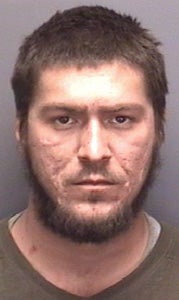Man gets five years for fatal crash
Published 9:43 pm Monday, May 19, 2014
A Norfolk man will serve five years in prison for his role in a fatal pileup on Route 460 last year.
Ronald Frank Quesenberry III apologized to the family of Thomas David Rush of Virginia Beach, who was 48 when he died during the Sept. 18 crash.
Quesenberry entered Alford pleas to charges of involuntary manslaughter, driving on a suspended license, felony reckless driving and operating his vehicle without an ignition interlock device. He was accused of being the cause of the eight-vehicle pileup, which included two tractor-trailers.
He had previously been convicted of driving under the influence of alcohol, which resulted in the suspended license and the requirement to have an ignition interlock device, a device that prevents the vehicle from starting if the driver’s blood alcohol content is above the legal limit.
The emotional sentencing hearing included six witnesses on each side, most of whom were family and friends of either the victim or the defendant.
“I would like to apologize to the entire Rush family and everyone else involved,” Quesenberry said just before the sentencing. “If I could, I would take his place. I’d much rather be dead than where I’m at right now.”
Rush’s family and friends described him as a good father, stepfather, grandfather, great-grandfather and fiancée.
“He was the most fun, loving, spirited person,” said Danielle Reardon, Rush’s granddaughter. “My 2-year-old asks me almost every day when his ‘Paw Paw’ is coming home. He doesn’t understand when I tell him his ‘Paw Paw’ is in heaven.”
Jennifer Reardon, Rush’s daughter, said the crash caused by the defendant “took a good person out of this world who can never be replaced.”
“My dad was trying to go to work that day, and he was following the laws,” she said.
Lorrie Stevens, Rush’s fiancée, said through tears that she had finally found true love in Rush after being through a painful divorce and surviving cancer in the last several years.
“It took everything away from me,” she said of Rush’s death. “I have nothing left.”
Her son, Matthew Stevens, said he looked up to Rush as a father.
Testifying for the defense, Marvin Harper said he was making a turn off Route 460 that morning when the accident occurred behind him. He said it appeared Quesenberry had tried to avoid an accident when someone made an unsafe lane change in front of him to get around Harper’s slowing vehicle.
Quesenberry’s family also testified. His mother, Lisa Quesenberry, said her son had been a happy child who quit high school and got his GED so that he could work to help support the family. His first child was born shortly after the accident.
“He loves that baby, and he is a wonderful father,” she said.
Melanie Brown, Quesenberry’s fiancée, said the two had been working hard to pay off all the fines and fees resulting from his conviction for driving under the influence of alcohol. As a result, his license was restored about two weeks after the accident, before he was arrested.
Tim Lavender, Quesenberry’s former employer, said Quesenberry was a good employee. Someone else usually gave him a ride, but the other person had overslept that day, Lavender said.
“I guess he did what he thought he had to do to get to work that day,” Lavender said. “He was trying to get to work to do what he was supposed to do as a father … as a fiancée and as an employee. He had every good intention that day.”
But prosecutor George Bruch said Quesenberry’s intentions were not so good.
“He intended to break the law,” Bruch said. “It was an avoidable crash. Mr. Quesenberry chose to drive at an excessive speed. He intended to drive the way he did, and he intended to drive recklessly.”
Bruch said in February, when Quesenberry entered his Alford pleas, that had the case gone to trial, witnesses would have testified Quesenberry was passing them as they drove between 60 and 65 miles per hour, weaving in and out of traffic without signaling and using his cellphone — though Quesenberry’s fiancée testified Monday that there was no indication of that on the couple’s cellphone records.
Quesenberry’s defense attorney, Kurt Gilchrist, said his client’s intentions were good.
“His intention was to put food on the table for his unborn baby and his fiancée.”
Judge Rodham T. Delk Jr. used a different food metaphor just before pronouncing his sentence.
“A simple decision led to what can only be called a banquet of consequences,” Delk said. “The food in this banquet is not delicious, not pleasant, but you are at the table to partake in this banquet of consequences.”







